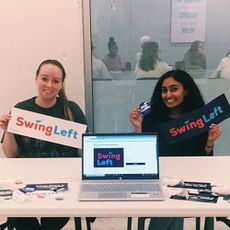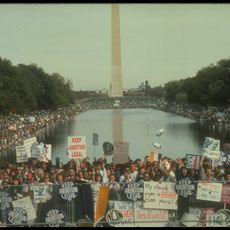

1) Make a list. Check it twice.2) Get personal.3) Start with your squad.4) Know when to strike.5) Be a broken record.6) Practice makes perfect.Sample Script: Money Talk Meets Mad Libs
Research shows that women don't like to ask for money. Even Senator Elizabeth Warren (D-MA) hates it: “It’s my least favorite part of the job by about 10 miles,” she told MC. “I’d rather have Donald Trump give me a root canal.” But fundraising is something no candidate can avoid, so we asked Emerge America, which has trained 2,500 women to run, for tips to help you swallow your fear.
RELATED STORY

1) Make a list. Check it twice.
Create a digital contacts list with work, home, and cell numbers. Include key information—spouse and children’s names, how you know them, conversation starters—and note how much to ask for from each.
2) Get personal.
Tell voters how your priorities will affect them. Make it clear that supporting you is a simple way for them to take action on issues they care about.
3) Start with your squad.
The easiest asks are people closest to you, so hit up your inner circle and work outward.
4) Know when to strike.
Try calling people at work between 10 a.m. and noon, or from 2 to 4 p.m. Phone people at home between 6 and 8 p.m.
2117: the year women will achieve political parity if progress continues at the same rate it has since 1960.
5) Be a broken record.
Part of President Barack Obama’s success was in getting donors to give small amounts many times. So don’t be afraid to ask repeatedly. You’ll get the most money in person, then over the phone, then by e-mail—so ask multiple times in different ways.
Stay In The Know
Marie Claire email subscribers get intel on fashion and beauty trends, hot-off-the-press celebrity news, and more. Sign up here.
6) Practice makes perfect.
Make practice phone calls to friends and staffers. Try your script on people of different ages and backgrounds—not everyone speaks or reacts the same.
Sample Script: Money Talk Meets Mad Libs
Ring, ring. [Ask for a specific person.] If no one picks up, say in your voicemail that you have a campaign update to share. Don’t ask for money—you’ll never get a call back!
If you know the person: Start with pleasantries: Hi, this is [name]. [Insert small talk about family, work, something you have in common, or, when all else fails, the weather.

If the person is a stranger: Say your name, what office you’re running for, and when the election is, and ask a question to which you know the answer will be yes to get them agreeing with you early on.
Get to the point. I’m calling because I’m running for [position]. I’m thrilled to be taking this step because it will give me the chance to fight for [list an issue you want to take on].
Segue to the ask. I’m glad you’re excited about my candidacy, and I’m hoping you’ll support me by investing in my campaign. Would you be able to contribute [list a specific dollar amount; ask for double what you think they can afford] today? Pause for response. (Doodle, drink a few sips of water, squeeze a stress ball—whatever it takes to get through 20 seconds of silence!)
If they say yes: Thank them and ask how to follow up with a pledge letter or e-mail.
If they say maybe: Cut your ask in half.
If they say no: Thank them, and ask for their vote or for them to volunteer or put up a yard sign.
This article is part of our "Women Running for Office" series, which originally appeared in Marie Claire's November 2017 issue, on newsstands October 17. To view the full package, click here.
Kayla Webley Adler is the Deputy Editor of ELLE magazine. She edits cover stories, profiles, and narrative features on politics, culture, crime, and social trends. Previously, she worked as the Features Director at Marie Claire magazine and as a Staff Writer at TIME magazine.
-
 Forget 'Double Denim'—Beyoncé Is Tripling Up
Forget 'Double Denim'—Beyoncé Is Tripling UpHer Western era continues with her seventh (!) Canadian tuxedo.
By Julia Gray Published
-
 Zendaya Says She Feels “So Lucky” to Have the Support of Loved Ones Like Boyfriend Tom Holland
Zendaya Says She Feels “So Lucky” to Have the Support of Loved Ones Like Boyfriend Tom HollandShe premiered her new film, ‘Challengers,’ in L.A. last night as she continues her global press tour.
By Rachel Burchfield Published
-
 The Most Coveted Designer Belts Are Also the Most Unrecognizable
The Most Coveted Designer Belts Are Also the Most UnrecognizableBuck-up. There's a fierce appetite for this luxury IYKYK accessory.
By Julia Marzovilla Published
-
 36 Ways Women Still Aren't Equal to Men
36 Ways Women Still Aren't Equal to MenIt's just one of the many ways women still aren't equal to men.
By Brooke Knappenberger Last updated
-
 How New York's First Female Governor Plans to Fight for Women If Reelected
How New York's First Female Governor Plans to Fight for Women If ReelectedKathy Hochul twice came to power because men resigned amid sexual harassment scandals. Here, how she's leading differently.
By Emily Tisch Sussman Last updated
-
 Why the 2022 Midterm Elections Are So Critical
Why the 2022 Midterm Elections Are So CriticalAs we blaze through a highly charged midterm election season, Swing Left Executive Director Yasmin Radjy highlights rising stars who are fighting for women’s rights.
By Tanya Benedicto Klich Published
-
 Tammy Duckworth: 'I’m Mad as Hell' About the Lack of Federal Action on Gun Safety
Tammy Duckworth: 'I’m Mad as Hell' About the Lack of Federal Action on Gun SafetyThe Illinois Senator won't let the memory of the Highland Park shooting just fade away.
By Sen. Tammy Duckworth Published
-
 Roe Is Gone. We Have to Keep Fighting.
Roe Is Gone. We Have to Keep Fighting.Democracy always offers a path forward even when we feel thrust into the past.
By Beth Silvers and Sarah Stewart Holland, hosts of Pantsuit Politics Podcast Published
-
 The Supreme Court's Mississippi Abortion Rights Case: What to Know
The Supreme Court's Mississippi Abortion Rights Case: What to KnowThe case could threaten Roe v. Wade.
By Megan DiTrolio Published
-
 Sex Trafficking Victims Are Being Punished. A New Law Could Change That.
Sex Trafficking Victims Are Being Punished. A New Law Could Change That.Victims of sexual abuse are quietly criminalized. Sara's Law protects kids that fight back.
By Dr. Devin J. Buckley and Erin Regan Published
-
 My Family and I Live in Navajo Nation. We Don't Have Access to Clean Running Water
My Family and I Live in Navajo Nation. We Don't Have Access to Clean Running Water"They say that the United States is one of the wealthiest countries in the world. Why are citizens still living with no access to clean water?"
By Amanda L. As Told To Rachel Epstein Published